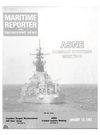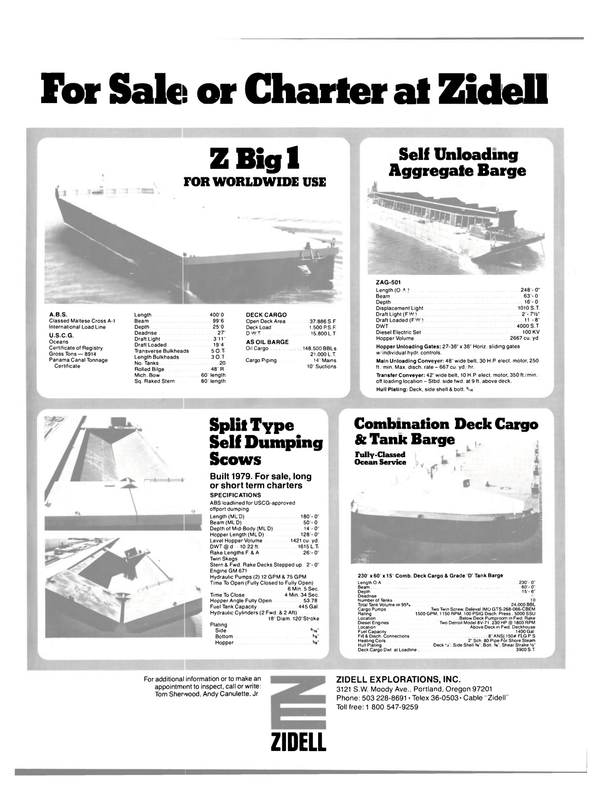
New USCG Pollution Prevention Requirements Effective October 2
The U.S. Coast Guard has announced that new requirements concerning prevention of pollution from ships will become effective on October 2, 1983.
For some U.S. shipowners and operators the new rules will mean changes in operating procedures and for others new equipment will be required. Also, a new International Oil Pollution Prevention Certificate will now be required for vessels trading in foreign ports.
Any U.S. seagoing ship of 400 gross tons or more will be required to install oily-water separating equipment or filtering systems for the treatment of engine room bilge water. Seagoing tankers 150 gross tons or more and other seagoing ships of 400 gross tons or more will be required to have a copy of the revised oil record book for recording time, location, method of discharges of oil or oily water.
Ships of less than 400 gross tons must retain oily water onboard for discharge to reception facilities, or they may fit oilywater separating equipment or filtering systems required of the larger ships.
The new requirements result from the International Convention for the Prevention of Pollution from Ships, 1973, as modified by the Protocol of 1978.
Most of the requirements pertaining to tankers have already been incorporated into Coast Guard regulations under authority of the Port and Tanker Safety Act of 1978.
Details concerning the new pollution prevention changes may be obtained by writing the Commandant (G-WER-2), U.S. Coast Guard Headquarters, Washington, D.C. 20593.
Read New USCG Pollution Prevention Requirements Effective October 2 in Pdf, Flash or Html5 edition of January 15, 1983 Maritime Reporter
Other stories from January 15, 1983 issue
Content
- Aalborg Vaerft Conducts Tank Tests Of New Cruise Liner Model page: 6
- Thomas Marine Delivers Two 38-Foot Police Patrol Boats page: 8
- Todd Pacific Delivers Guided Missile Frigate Reid To The U.S. Navy page: 8
- Kone And Far East-Levingston In Joint Venture For Crane Manufacturing In Singapore page: 10
- CSSRA Urges Adoption Of Canadian Building Policy page: 10
- Leevac Corporation Names Terry Hardouin Planning Manager page: 10
- Tidewater Marine Buys T1 Vessels From Halter Marine For $33 Million page: 11
- A.S.N.E. PUTTING FIRE POWER TO SEA page: 12
- Elliott Awarded Additional Contract For Thruster Unit page: 15
- Roger Ffooks Appointed European Representative For J.J. Henry Firm page: 15
- Battleship New Jersey Is Recommissioned page: 16
- Norshipco's Floating Drydock Titan' Aids In Tunnel Construction Project page: 16
- Aeroquip Names Manager, Contract Administration, For M a r i n e / M i l i t a r y Products page: 17
- Two Ro/Ro's For Saudi Arabia Dedicated At Kockums, Four-Ship Order Valued At $250 Million page: 17
- Navy Civil Engineering Lab Completes Studies On Future Pier Designs page: 18
- New Marine Insurance Brochure Available From Skuld In Norway page: 18
- Dravo Appoints Three Senior Officials In Its Marine Construction Organization page: 19
- $32.6-Million Title XI Sought For Purchase And Rebuilding Of RO/RO page: 19
- SKF Couplings Described In Free 26-Page Full-Color Brochure page: 19
- Joseph Farrell Selected As New AWO President page: 20
- Navy Awards $1.87-Million Crane Contract To Clyde page: 20
- Ship Model Basin Dedicated At N.Y. State Maritime College page: 20
- New Ferry Contract For Over $1-Million Awarded To Offshore Shipbuilding page: 21
- Lykes Ship Sends Data By Satellite-Phone Hookup page: 21
- Oceans '83 Conference Issues Call For Papers page: 21
- Nichols Brothers Yard Starts Work On 265-Foot Split-Hull Hopper Dredge page: 21
- Ehrenfried Of Metritape Presents Paper At SNAME New England Meeting page: 21
- MAN-B&W Diesel Holds Symposium For West Coast Marine Industry Leaders page: 22
- Bruce D. Smith Elected President Of COMSAT Technology Products page: 22
- MacGregor To Equip 30 Barges, 3 Ships Building In Japan For Paraguay page: 22
- Barber President Named Commissioner Of Pilots page: 35
- Bates To Retire As ACL Chairman At End Of '83, —Koch Named Successor page: 35
- $ 5 . 4 - M i l l i o n Navy Contract A w a r d e d Tracor For SSBN Sonar Systems Services page: 36
- Romanelli Joins Fairhaven M a r i n e As Vice President page: 36
- Kelly Named Vice President Of Lykes Pacific Division page: 37
- M a r A d Offers Report On Shipboard Fuel Handling And Conditioning page: 37
- New 15-100 H.P. Barge Spotters Described In Free Literature page: 37
- Lockheed To Build Prototype Vehicles To*' Destroy Naval Mines page: 38
- Coast Guard Publishes Revised Navigation Rules page: 39
- Johnson & Towers Named Alco Diesel Distributor —Literature Offered page: 39
- ASNE Southern New England Discusses Sub Combat Systems page: 41
- MarAd Approves Crowley Acquisition Of Delta Steamship Stock For $96 Million page: 42
- LTI Introduces New System For M o v i n g Ship Sections —Literature A v a i l a b le page: 43
- SNAME-Philadelphia Section Hears Paper On Marine Epoxy Resin Chocks page: 44
- Trellclean Conducts Technical Briefing And Hull-Cleaning Demonstration page: 44
- Uniflite Announces Three Executive Appointments page: 45
- Deep-Notch Tug And Barge Delivered To Energy Transportation page: 45
- Jackup Rig "Sam Noble" Is Christened At Levingston page: 46
- New USCG Pollution Prevention Requirements Effective October 2 page: 46
- Stone Manganese Offers Technical Reports On Fuel Economy And Propellers page: 48
- Burton Delivers 224-Foot Seiner, Sixth Of Seven Foir Van Camp page: 48
- Pan-American Naval Engineers To Hold 1983 Meeting in D.C. page: 48
- Paceco Delivers Railmounted Transtainer Crane To U.S. Army page: 53
- Hoffert Manufacturing Awards Caribbean Cruise At SNAME Exposition page: 58
- Nome Seeks $38.5-Million For Proposed Year-Round Port page: 58
- Bay Shipbuilding Retains W i l l i am Thompson As Washington Representative page: 59
- Bulk Carrier Karnataka Undergoes Repairs, Modernization At HUD page: 59
- Dravo Launches Coastal Hopper Barge For C.G. Willis page: 59


